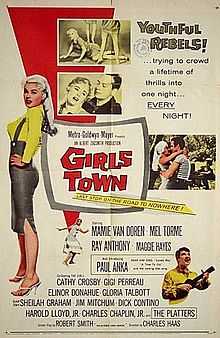Girls Town
| Girls Town | |
|---|---|
 Girls Town movie poster.jpg | |
| Directed by | Charles F. Haas |
| Written by |
Robert Hardy Andrews Robert Smith |
| Starring |
Mamie van Doren Mel Tormé Ray Anthony Paul Anka |
| Distributed by | Metro-Goldwyn-Mayer |
| Release dates | 5 October 1959 |
| Running time | 90 min. |
| Language | English |
| Budget | $457,000[1] |
| Box office | $875,000[1] |
Girls Town is a 1959 film produced by Metro-Goldwyn-Mayer, starring Mamie Van Doren, Mel Tormé and Ray Anthony; Paul Anka also appears in his first acting role. Van Doren stars as a juvenile delinquent who is sent to a girls school run by nuns, where she finds herself unable to help her sister. The film capitalizes on the 1950s rebellious teen exploitation films, with cat-fights, car races, music from Paul Anka and The Platters, and sexy outfits.
Girls Town was lampooned in September 1994 on movie-mocking television series Mystery Science Theater 3000. About 15 minutes of the actual film was cut from this version.
Plot
The movie opens with a young woman fending off an attempted rape. In the process the would-be rapist accidentally falls off a cliff to his death. Circumstantial evidence places 16-year-old delinquent Silver (played by a 27-year-old Van Doren) at the scene and she is sent to Girls Town, a rehabilitation village run by a group of nuns. There she lives with Serafina (Gigi Perreau) and some tough chicks. Trouble and misunderstandings ensue. Troublemaker Fred (Tormé) saw the cliff incident from a distance and realizes it was actually Silver's sister, Mary Lee (Elinor Donahue), who was there. Fred blackmails Mary Lee into being his partner in deadly "hands-off drag racing," then prepares to take her to Tijuana to sell her into the slave trade. Silver finally wins the respect of her Girls Town friends, but can they rescue Mary Lee?
A side plot involves Serafina swooning over famous singer Jimmy (Anka). During the film he sings "Lonely Boy", "It's Time to Cry", "Girls Town Blues", and "Ave Maria". A scene set in a night club features The Platters singing "Wish It Were Me".
Box Office
According to MGM records the film earned $375,000 in the US and Canada and $500,000 elsewhere, resulting in a loss of $65,000.[1]